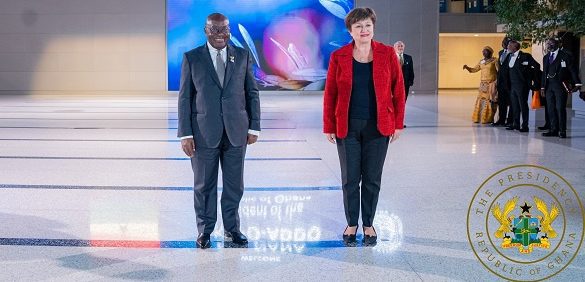The Director of the Institue of Statistical, Social and Economic Research (ISSER) of the University of Ghana, Professor Peter Quartey has said that he expects investors’ confidence to be restored in Ghana following the approval of the $ 3 billion bailout by the International Monetary Fund (IMF).
He also said he expects the deal to help stabilize the exchange rate.
Speaking in an interview with TV3’s Paa Kwasi Asare on Wednesday, May 17, Prof Quartey said “The programme will come with certain conditionalities but these are not conditions that have been imposed on us, let us make that point, every conditionality you see is something we agreed to undertake.
“The IMF will sit with you, and discuss with you where you find yourselves and where you want to go, and what measures you want to take to ensure debt sustainability. What are the measures to take to ensure that you enhance your revenue mobilization, to ensure fiscal discipline, you grow your economy, and you ensure stability?
“These are programmes that we prepared as a country and submitted to the IMF so I don’t think you will see anything different from what we had agreed to. If there are harsh conditions it is something that we have agreed to sign onto.”
He added “Of course, there will be a freeze on employment, sometimes they say net freeze on employment depending on what we will find in the programme but that may come with some painful lessons for the labour front.
“But if we are able to grow the private sector, if all these resources, the credibility and all that the IMF programme brings on board, are used to leverage the growth in the private sector, then the private sector can withstand and absorb some of the labour falls that otherwise would have been absorbed by the public sector. The public sector alone can’t employ everybody, we need to grow the private sector.
“But also what I expect to see going forward; investor confidence coming back. It comes with resources so we are going to get the balance of payment support that can help us service some of our debts, it can help us pay for some necessary imports, whatever we need to import that money can be relied upon. That can help shore our reserves and also ensure some exchange rate stability. Lately, we have seen the level of depreciation of the Cedi as reduced and we have seen an even level of appreciation occurring.
“So we have seen signs of that already. IMF will bring in technical support as well as ensure that we achieve macro stability and fiscal discipline. The hard choices that we are unable to take on our own, the headmaster or the IMF will help us to achieve this fiscal discipline.”
Prof Quartey further stated that “The significant savings that we are going to make from the debt exchange programme, and the external creditors, there will be some debt forgiveness, debt cancellation, and interest rate reduction within the domestic and international markets. That will free us or give us some leverage to use those resources to invest in some critical areas of the economy.
“Money that otherwise we would have spent in servicing debt would have been spent to pay more of the principal, those savings that we are going to make, I think we should have the plan to channel some of these resources into the productive sectors, into enhancing productivity, into enhancing the work of the private sector.”
The Board of the Fund unanimously approved Ghana’s bailout on Wednesday, May 17 at a meeting in Washington after Ghana secured the Paris Club financing assurance on Friday, May 12.
A press statement issued by the Paris Club on Friday, May 12 said “The creditor committee stresses that the Ghanaian authorities are expected to seek from all private creditors and other official bilateral creditors debt treatments on terms at least as favorable as those being considered by the creditor committee, in line with the comparability of treatment principle.
Consequently, it added “the creditor committee urges private creditors and other official bilateral creditors to commit without delay to negotiate with Ghana such debt treatments that are crucial to ensure the full effectiveness of the debt treatment for Ghana under the Common Framework.”
Also, a creditor committee for Ghana has been formed by countries with eligible claims to see to the quick implementation of the resolution. The creditor committee is expected to be co-chaired by China and France.
“The creditor committee examined the macroeconomic and financial situation of Ghana, including its long-term debt sustainability, and its formal request for a debt treatment under the “Common Framework for Debt Treatments beyond the DSSI” endorsed under the Saudi G20 Presidency in November 2020, which was also endorsed by the Paris Club.”
“The creditor committee supports Ghana’s envisaged IMF upper credit tranche (UCT) program and its swift adoption by the IMF Executive Board to address Ghana’s urgent financing needs.
“The creditor committee encourages Multilateral Development Banks (MDBs) to maximize their support for Ghana to meet its long-term financial needs,” the statement added.
The Fund will on Thursday, May 18 give details on Ghana’s disbursements.
In a media advisory on Wednesday, the IMF says a virtual press conference will be held on Thursday in Washington DC “to brief journalists on the outcomes of IMF Executive Board meeting on Ghana’s request for an Extended Credit Facility Arrangement, which will take place on Wednesday, May 17”.
Minister of Finance Kenneth Nana Yaw Kuntukunuku Ofori-Atta and Central Bank Governor Dr Ernest Kwamina Yedu Addison will join the IMF Mission Chief for Ghana, Stephane Roudet, for the press conference.
Senior Communications Officer for IMF Tatiana Mossot will coordinate the press conference.


